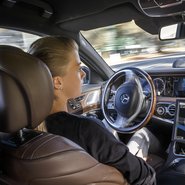- About
- Subscribe Now
- New York,
March 25, 2015

 Mercedes autonomously driving car
Mercedes autonomously driving car
Safety and price concerns deter many from self-driving vehicles, but the technology and the potential for a decrease in accidents have consumers intrigued by the futuristic driving, according to a recent report from The Harris Poll.
Many consumers have been anticipating a self-driving car for decades, assuming even the flying car from "The Jetsons" might be a reality in the future, but when it comes to physically driving in these vehicles, most become wary. As production teams work to improve the vehicle technology of autonomous automobiles, marketing teams have to strive to improve the mindset of consumers around the world.
"I think luxury consumers embrace technology more than mainstream," said Ian Beavis, executive vice president at Nielsen.
"I think some consumers think it is dangerous and that is a lack of familiarity with the technology," he said.
The Harris Poll is the result of 2,276 United States adults polled between Nov. 12-17, 2014.
Look into the future
In the U.S. 81 percent of adults drive as their main means of transportation and 87 percent currently own, lease or regularly use a vehicle. In fact, more than half of those polled claim to have more than one car per household and an average of 25.6 miles are driven by Americans everyday.
"Early adapters will love self driving cars because they really truly do not love driving their own vehicle. They were more likely want to get from point A to point B and are constantly distracted," said Lauren Fix, automotive expert and author of “Lauren Fix’s Guide to Loving Your Car,” Lancaster, NY.
"Just like Tesla early adapters may continue to tell all the positive features while others will not be satisfied with the disconnection and the freedom of driving around vehicle," she said.
According to those polled, self-driving vehicles are the future of driving. Baby boomers felt the most strongly about this, and men were much more adamant about the autonomous driving future than women.
Mercedes' Luxury in Motion
However, almost an equal amount of consumers believed self-driving is an unnecessary luxury and it is only something rich people can afford.
Safety of self-driving cars
Almost half of consumers believe that these vehicles are somewhat safe for those inside and 43 percent believe it is safe of the other drivers nearby. However, pedestrian safety is a greater concern.
Audi self-driving campaign
Also, there is a rising concern for the driving skills of the cars in urban settings. Females worry more than males about the error-making of the vehicles. For instance, 52 percent of women think autonomous cars are more likely to make an error when driving on a highway, whereas 39 percent of men feel the same way.
There is a general consensus that self-driving cars will allow for fewer accidents by drunk drivers and distracted drivers and will reduce the likelihood of speeding tickets.
However, 25 percent of consumers do not see a benefit to self-driving vehicles.
"Many consumers are concerned about autonomous vehicles because they don't want it to be a trend and have to deal with the expenses of repairing it or having it become obsolete," Ms. Fix said.
"Many customers will never believe in autonomous cars because they feel they are not controlling a 4000 pound vehicle and therefore it must be dangerous. To change that opinion will only take time and personal experience," she said.
Different views
Changing the mindset of consumers takes time, patience, and proof. Marketers will have to integrate the numbers produced by their tech teams into campaigns that ease the concerns of consumers.
Many brands have released test vehicles as the beginning steps to consumer approval.
For instance, German automaker Audi showed that its Audi A7 autonomous concept vehicle can seamlessly meld into traffic by going on a 560-mile test drive.
Audi piloted its concept vehicle, nicknamed “Jack,” from Silicon Valley, CA to Las Vegas for the annual Consumer Electronics Show, which concluded on Jan. 9. In a time when many automakers are unveiling and testing autonomous driving experiences, showing the realistic implications can help consumers learn to trust the latest technologies (see story).
Similarly, German automaker Mercedes-Benz opened the doors on self-driving automobiles with its F 015 “Luxury in Motion” research vehicle released at the Consumer Electronics Show in Las Vegas.
The new vehicle demonstrates the future of driving with its inward facing seats and self-propelled and self-reliant technology that will be able to fully operate a car without human assistance. The release of Mercedes-Benz’s research vehicle will spark interest and gain attention among those who were previously skeptic about self-piloted vehicles and will likely place Mercedes as a leader in autonomous driving technology (see story).
Luxury consumers are often intrigues by the newest technologies, self-driving cars will likely see interest from these people and others interested in what technology can offer.
"There is a chunk of luxury consumers who are really into technology and it is one of the reasons they buy luxury cars and another group of people are those driving long distances, it has the benefits of more free time and productivity and those sorts of things," Mr. Beavis said.
Final Take
Nancy Buckley, editorial assistant on Luxury Daily, New York
Share your thoughts. Click here